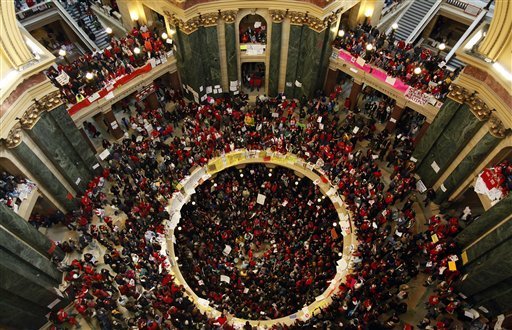
http://blog.contrarymagazine.com
About a month ago, most UR students returned from their spring breaks spent in exotic locales such as Punta Cana and Panama City. I, however, returned from a different locale: Madison, the capital of Wisconsin. The Saturday before my return to Rochester, I journeyed up to Madison with a group of like-minded individuals to join the protests engulfing the state capitol.
That past Wednesday, the Republican-controlled State Senate had passed controversial legislation restricting the power of public employee unions. Ever since the state’s new Republican governor, Scott Walker, proposed the law a month earlier, protesters numbering in the tens of thousands had have been camping in and around the state capitol building, making their opposition to the law heard.
The passage of the law only further angered the protesters. Its passage occurred in spite of the fact that the State Senate needed 20 of its 33 members present to vote on the public union-busting proposal as part of the upcoming fiscal year’s budget proposal. Republicans currently possess only 19 seats in the legislative body, which allowed Wisconsin’s 14 Democratic senators to flee to Illinois to prevent the anti-public union proposal from being debated.
Despite Walker’s claim that the anti-union proposal was necessary to balance the state’s finances, the State Senate stripped it from the budget and voted on it separately — which required only a simple majority of the chamber’s body to proceed with debate. While the implementation of the law has been prevented as a result of legal challenges to it, the protests in Madison continue to this day.
Should the legislation be upheld by the courts, it will not directly affect me, as I am not currently a resident of Wisconsin, nor am I currently employed by its government. I ventured to Madison as a member of the American middle class, a shrinking segment of our society. For the past 30 years, economic inequality in the U.S. has sharply increased, as both American political parties have largely pursued deregulatory economic policies while in office. While overall wealth has increased over that time period,the vast majority of Americans will not experience the benefits of that wealth.
As the social safety net gets slashed and the cost of living rises, it has become harder and harder for average American families to secure a stable footing within American society. If these policies are carried out far enough, we will likely see American society resemble that of the Gilded Age of the late 19th century, with a small upper class over the rest of us “unwashed masses.”
The modern labor movement was born in response to the excesses and social ills of the Gilded Age. It was designed to ensure that the employees of the “robber barons” of the age received fair treatment.
Whereas one employee agitating for higher pay and better working conditions could be fired for his demands, the collective power of workers organizing to fight for their rights forced employers to recognize them.
Many things that we take for granted today, such as the weekend and laws prohibiting child labor, sprung from union activism.
As union members no longer needed to worry about problems such as low wages and health concerns in the workplace, they could afford to send their children to get an education, allowing them access to further opportunity and prosperity.
My parents are not union members, yet the rights that unions fought for benefited them directly. Their grandparents were union members who were able to join the middle class because of the reforms that their unions fought for in the early 20th century.
They were able to send my grandparents to college. In turn, my grandparents were able to gain better jobs, afford a middle-class lifestyle and pay for college educations for my parents.
That is why I went up to Madison. Regardless of who they represent, an attack on the rights of one union is an attack on the rights of all unions — and without unions, there would be no middle class.

